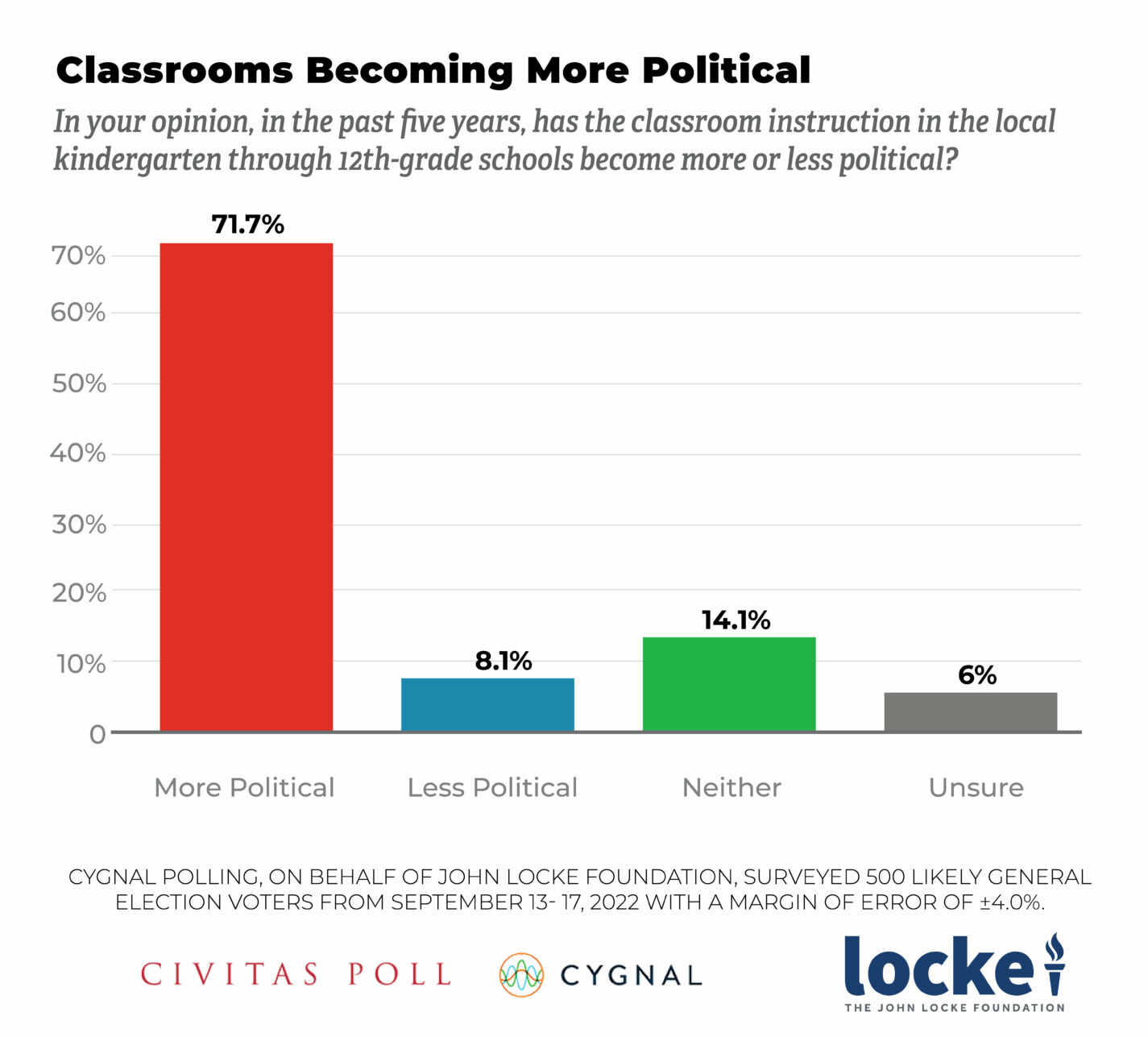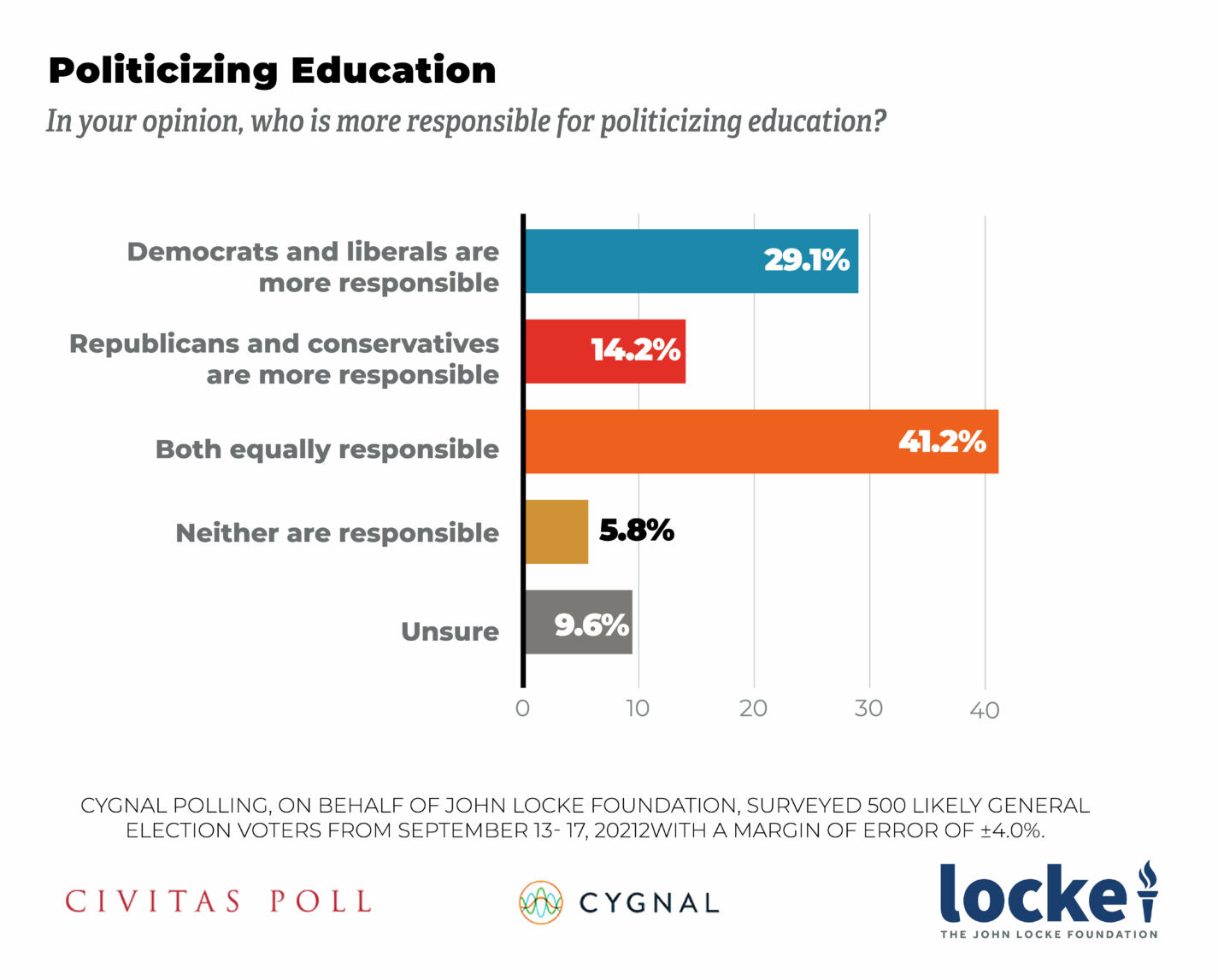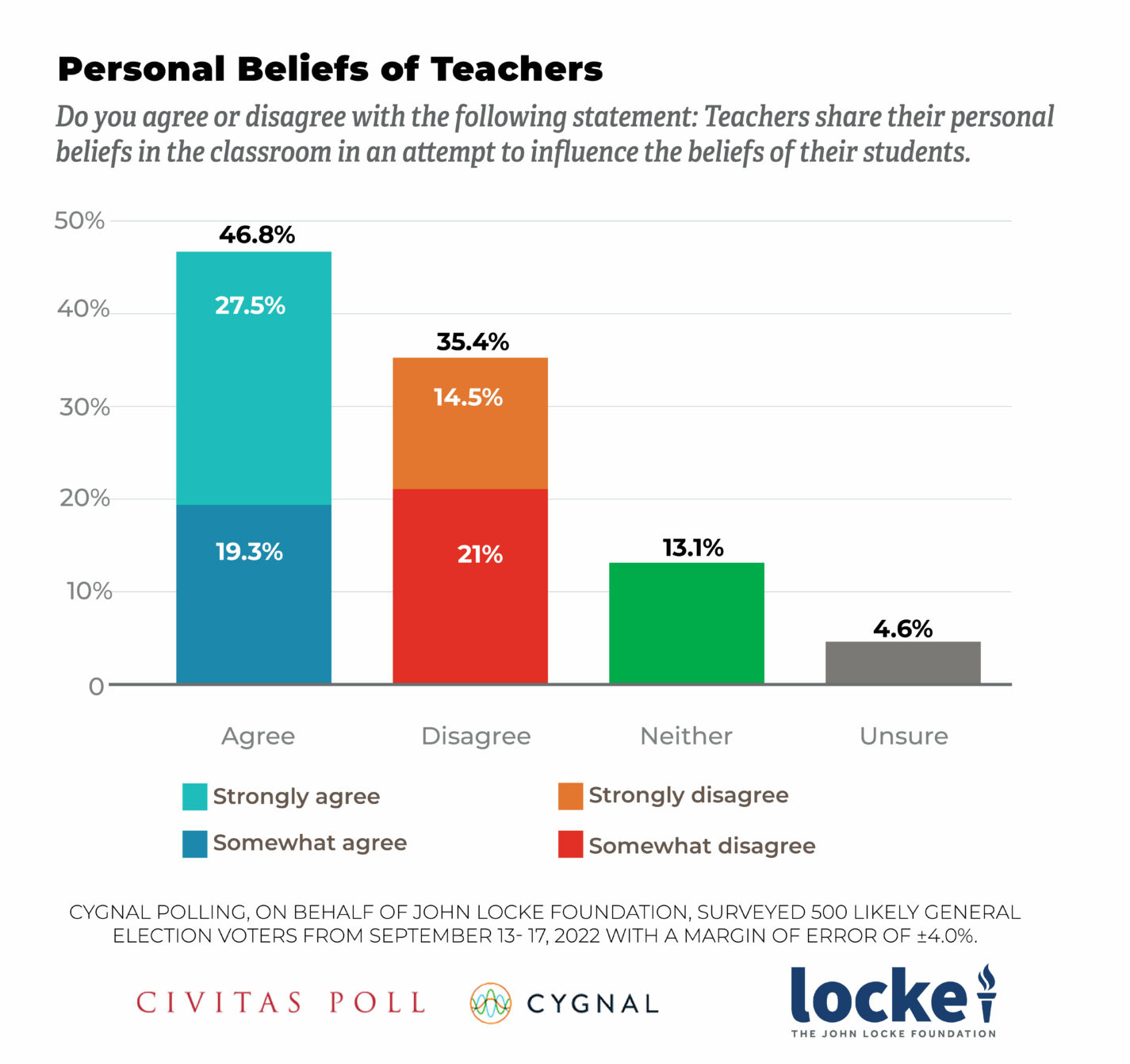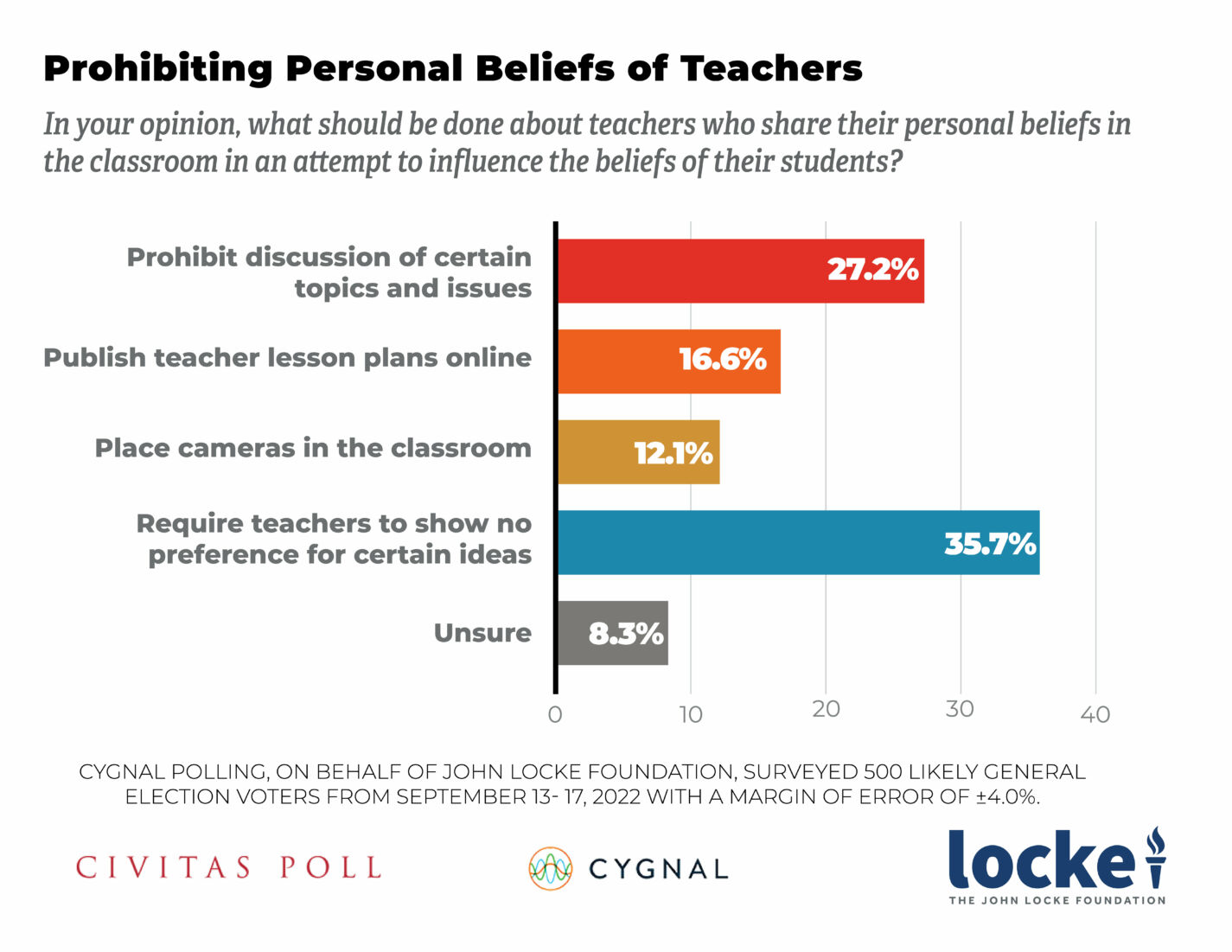Poll reveals concerns about teachers and what's going on in the classroom
Published November 3, 2022
By Bob Luebke
- A new Civitas Poll of North Carolina parents has new information on their views of teachers and what is happening in the classroom
- Four in ten parents blamed both parties for bringing politics into the classroom, but generally blamed Democrats more
- While almost half of parents surveyed said teachers shared their personal beliefs in the classroom to influence students, they had no clear-cut solution for correcting the problem
Education remains one of the hottest topics in this fall’s election. Controversial issues like school closures, critical race theory, and teaching sexual orientation and gender identity in the classroom have energized parents on both sides of these issues. Hundreds of school board members are up for election this fall. Individual elections and the composition of boards will have a tremendous impact on how boards deal with not only the controversial issues but also the bread-and-butter issues of budgets, teacher salaries, and what is taught in the classroom.
This article reports on the findings of the Civitas Poll of North Carolina parents regarding their views of teachers and about what goes on in the classroom. Previous briefs in this series looked at their views on the general direction of public education and how public schools are doing and also what they think about how schools handle controversial books and topics. (You can access the poll results here). The results were informative and helpful to anyone wanting to understand how parents in North Carolina think about teachers and what’s going on in the classroom. Let’s review a few of the questions.
Politics in the Classroom
Growing numbers of Americans are beginning to think of classrooms as places of indoctrination, infested with politics. That’s a sharp criticism of public education. Is this sentiment present among North Carolina parents? To find out, we asked the following:

The results were enlightening. Over 70 percent of North Carolina parents surveyed said classrooms had become more politicized. A deeper dive in the crosstabs shows this sentiment is strong across all categories of parents, but especially so among Republicans (84 percent), upper-educated males (81 percent), and those with high incomes (79 percent). By political affiliation, Republicans (84 percent) were most worried about politicized classrooms, but large majorities of Democrats (67 percent) and Independents (69 percent) were, too. Also significant is that less than ten percent (8.1 percent) of parental respondents thought classrooms were less political, while only 14 percent thought they “were becoming neither more or less political.” The belief that classrooms are politicized is both substantive and real among North Carolina parents.
Who Is to Blame for Politicized Classrooms?
The Civitas Poll also asked parents who they considered responsible for politicizing the classrooms:

A plurality of parents (41 percent) blamed both sides of the political divide — Democrats and liberals, Republicans and conservatives — equally for politicizing classrooms. Of the 43 percent of parents who found one side more culpable, Democrats received over twice the blame as Republicans (29.1 percent to 14.2 percent).
Democrats and liberals were considered more responsible for politicizing our classrooms by almost half (48 percent) of Republicans, but by only 22 percent of Democrats and 19 percent of Independents. Women over the age of 65 (62 percent), upper-educated men (45 percent), and parents with incomes over $100,000 per year (42 percent) also blamed Democrats and liberals.
Conversely, few seem to hold Republicans and conservatives responsible for increased politicization. Only 19 percent of Democrats, 12 percent of Republicans, and 13 percent of Independents thought Republicans and conservatives were to blame. Independents (49 percent) and moderates (55 percent) blamed both parties.
Do teachers seek to influence the beliefs of their students?

According to the results, just under half of respondents (47 percent) agreed that “Teachers share their personal beliefs in the classroom in an attempt to influence the beliefs of their students.” According to the survey crosstabs, parents most concerned about this problem were urban parents (55 percent), upper-educated male parents (56 percent), upper income parents (58 percent), and Republican parents (54 percent).
Over a third (35 percent) of parents disagreed. The parents who disagreed that teachers were sharing personal beliefs in the classroom to influence students were moderates (42 percent), suburban parents (42 percent), and parents in the “Other Races” category (46 percent).
What can be done about teachers who share their personal beliefs to influence students?
While poll results suggest parents are concerned about teachers pushing their beliefs on students, do they have a clear idea on what to do about it? Here’s what we found:

Most parents (36 percent) selected, “Require teachers to show no preference for certain ideas” as the best way to address teachers injecting their personal beliefs into the classroom. It was supported by 39 percent of Republicans, 36 percent of Democrats, and 32 percent of Independents.
The second most popular response (27 percent) was “Prohibit discussion of certain topics and issues,” which was supported by 34 percent of Republicans and 31 percent of Independents, but only 19 percent of Democrats. The other two responses — “Publish teacher lesson plans online” and “Place cameras in the classroom” — had limited support. Summed together, they tallied only a little over 25 percent of parental respondents and ranked low in frequency of response.
Summary
What do parents think about teachers and what is going on in the classroom? Poll results reveal unfavorable views. An overwhelming majority of parents think our classrooms are becoming more politicized. They blame both parties for the problem.
Finally, nearly half of parents surveyed think teachers share their personal beliefs in the classroom in order to influence the beliefs of students. While over a third of parents would prefer that teachers show no preference for certain ideas, and over a fourth would prohibit discussion of certain topics and issues, no clear solution to the problem emerged. How these sentiments will influence local school board elections or other political races is unknown, but they are of deep significance and interest.
The last article of this four-part series will review parental views on who is best equipped to make decisions about how children are educated and their thoughts about school board powers and performance.







